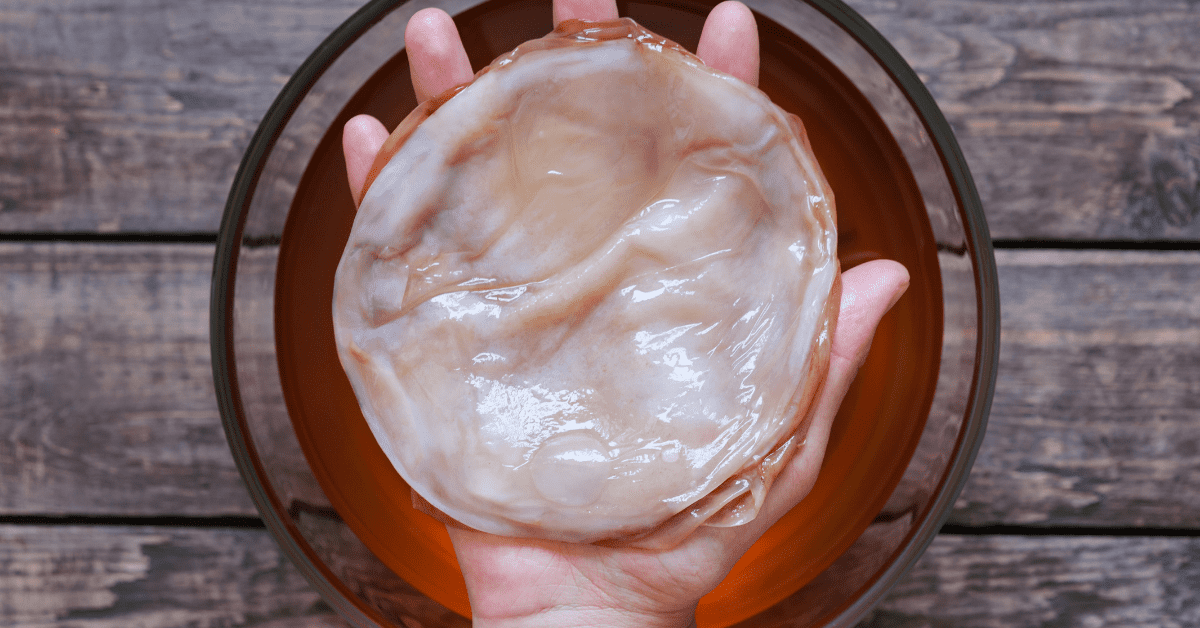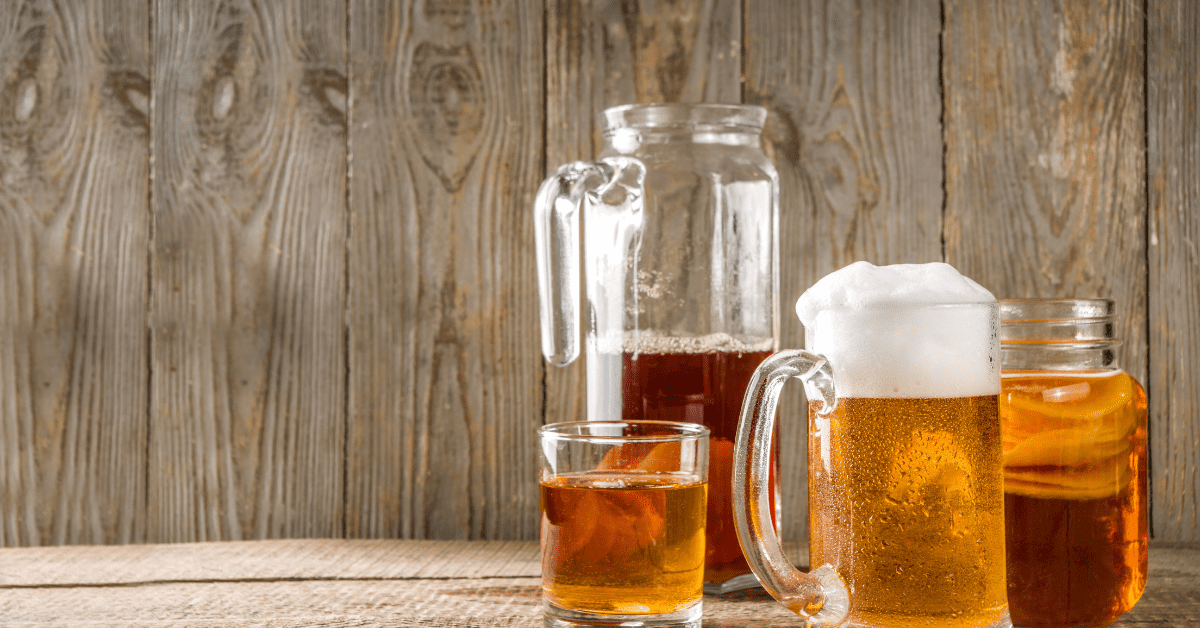Kombucha is a fermented tea that people have been brewing at home for centuries. But is kombucha safe to drink for those of us with illnesses like lupus? This article should help answer that question for you.
Originating from northeast China during the Tsin Dynasty in 220 B.C., it spread to Japan around 414 A.D. as a medicine. Before making its way through trade routes to Russia and eastern Europe. [1][2]
Kombucha’s worldwide popularity has wavered since World War 2. But it appears to be at all an all-time high in recent years. [1] Parallel with the scientific movement researching the role gut microbiome has on health.
In 2016, PepsiCo bought KeVita, a popular functional probiotic and kombucha beverage maker.
In 2017, retail sales of kombucha and other fermented beverages went up by 37.4%. [3]
In 2018, kombucha grew by 49% in terms of dollar value over 52 weeks. [4]
Kombucha is reportedly the fastest growing product in the functional beverage market. [5] The global market size in 2019 was $1.3 billon and is projected to reach $8.1 billion by 2027, according to an industry report.
Making kombucha tea one of the most popular low-alcoholic fermented beverages in the world. [6]

What is kombucha good for?
Researchers report that diet can shape your gut make-up, which can affect your immune system and overall health. [7]
For example, a 2021 study implies that eating fermented foods can increase your overall microbial diversity. Alongside lowering 19 different inflammatory proteins… and calming four types of immune cells.
What’s more, stronger effects came from larger servings. Giving us more reason to consume yogurts, fermented cottage cheese, kimchi, and other fermented vegetables. As well as vegetable brine drinks and kombucha tea.
A 2018 research review does claim kombucha has its own health benefits. Due to its bioactive components, such as polyphenols and glucuronic acid.
They highlight that kombucha can benefit you by:
- Protecting against the development of cardiovascular diseases… as a result of its polyphenol content that inhibits the oxidation of bad cholesterol (LDL)
- Regulating cholesterol metabolism
- Preventing high blood pressure by promoting smooth muscle relaxation
- Detoxing and possibly enhancing liver functions – thanks to its high glucuronic acid levels
It must be emphasized that concentration of the drink’s active components will vary depending on the SCOBY and elaboration methods. Also, that many studies are on animal subjects.

How is kombucha made?
Kombucha is a beverage made by fermenting tea and sugar with a Symbiotic Culture of Bacteria and Yeast… better known as a SCOBY. [7]
The tea they use to make kombucha is generally black tea or sometimes green and blue, or oolong tea.
Still, the tea chosen does dictate the composition of bioactive compounds and resulting biological activities. As green tea has a higher content of polyphenols than the other teas, it is the healthiest tea to use. More so due to its content of epigallocatechin-3-gallate (EGCG)… one of the strongest antioxidants in Kombucha [8]
– Click here to learn 5 hidden health benefits of drinking tea? –
Either way, the usual fermentation time is 7-10 days. Then you have to option to add flavourings to enhance the taste. Some even infuse the tea leaves with the likes of mint, lemon balm and jasmine.

What is the kombucha SCOBY?
The SCOBY is a biofilm of microorganisms resembling a mushroom cap, which becomes a starter for subsequent brews. It is common for this to be sold as the ‘kombucha mother.’
This ‘mother’ floats to the surface of the fermenting tea. This allows the microbes it houses to access both oxygen and the nutrients in the tea.
A number of yeast and bacteria exist within the SCOBY. But little is known as which species are essential for fermentation. And which presents a challenge for kombucha brewers.
A 2021 study suggests that there are essentially four main types of SCOBY.
Interestingly, each type consists of different combinations of yeast and bacteria working together. This contrasts with other fermented beverages, where a single organism consistently becomes dominant, as is the case for beer, wine and cider.
What we do know though, is that some metabolic products of the SCOBY possess antibacterial activity. These prevent pathogenic bacteria from contaminating the drink. [9]

Can kombucha get you drunk?
Kombucha can contain small amounts of alcohol, but not at levels substantial enough to get you drunk.
In a Food and Drug Administration study, kombucha brews had alcohol levels from 0.7% to 1.3%; with no methanol on show. [10]
After fermentation, kombucha is a cocktail of chemical components, such as: [11]
- Sugars
- Tea polyphenols
- Organic food acids
- Fibre
- Ethanol
- Amino acids including lysine
- Essential elements such as Copper, Iron, Manganese, Nickel, and Zinc
- Water-soluble vitamins such as vitamin C, and several B vitamins
- Carbon dioxide
- Antibiotic substances
- Hydrolytic enzymes

Can kombucha go bad and make you sick?
Still, it is possible for pathogenic microorganisms to contaminate the Kombucha tea throughout the preparation. Especially before the pH levels reach below 4.2. [12]
There is a chance that mould could contaminate your home-made kombucha. Above all with Penicillium and Aspergillus – a species known to cause carcinogenic and toxigenic effects. [13]
What’s more, even though kombucha is a safe drink most the time. There has been reports of some ill effects, such as: [14]
- “Metabolic acidosis” – The build-up of acid in the body due to kidney disease or kidney failure
- “Cholestatic hepatitis”
- “Hepatotoxicity” AKA Toxic Liver Disease
- “Hyponatremia” – low sodium blood levels
- “Lactic acidosis” – excess lactate levels
- “Pellagra” – severe vitamin B3 (Niacin) deficiency
- “Toxic hepatitis” – inflammation of the liver
- an allergic reaction
- Head and neck pain
- Yellow skin (Jaundice)
- Nausea and vomiting
There are also potential risks associated with a low pH brew leaching heavy metals from containers. Alongside drinking too much of a highly-acidic kombucha. [11]
Despite these implications, kombucha is not considered harmful if about 4 oz. (113ml) per day is consumed by healthy individuals. [15]

Who should not drink kombucha tea?
The chance of bad brew does pose an added risk for certain groups.
This includes those who are immune-compromised. In the same breath as individuals with pre-existing health conditions. [11]
For example, a male with HIV came into hospital with hyperthermia, lactic acidosis, and acute kidney failure within 15 hours and drinking kombucha. [16]
This could be the result of a bad batch. Yet, it does highlight that drinking kombucha does carry a risk for those with conditions like lupus.
On top of this, pregnant women are better off steering clear of kombucha tea. Kombucha can contain “heparin”, which inhibits your blood clotting system’s proteins and thins it. Being a major concern during the third trimester of pregnancy. [17]
How to make kombucha tea?
If you still wish to make your own kombucha tea at home, here is a simple step-by-step guide on how to do just that.
Make sure you do not allow fermentation to continue beyond 10 days. Acidity may rise to levels that could harm you… the equivalent to drinking undiluted vinegar.

If you enjoyed this post, please share. Also, feel free to leave your comments below or contact me to share your thoughts. What’s more, check out my other articles here. Some suggested reading are:
- 5 Hidden Health Benefits of Tea
- Could Turmeric be the root cure to Autoimmune Diseases?
- 5 Rotten Reasons Why Soft Drinks are Bad for You
Pingback: 5 Hidden Health Benefits of Drinking Tea (2021) -